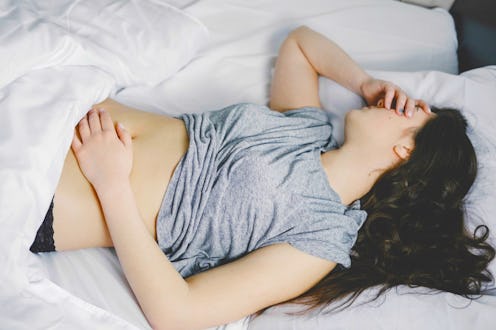Life
Here’s What An OB/GYN Wants You To Know About Endometriosis & Fertility

In February of 2016, Diana Falzone was working as a news reporter when she was struck with a stabbing pain that “felt like a hot knife” — and then she started bleeding, heavily. But she knew it wasn’t the right time of the month for her period. “I didn’t know what the heck was going on,” Falzone tells Bustle. “I just knew that something was seriously off.”
After about a month of jumping between doctors, Falzone was diagnosed with endometriosis, a chronic disease that affects about one in 10 people with uteruses and, for some people, can lead to fertility issues. Endometriosis occurs when tissue similar to the uterine lining grows outside of the uterus. The severity of endometriosis symptoms can range from worse-than-average periods to feeling like you have to pee all the time to debilitating pain, particular during menstruation. In Falzone’s case, her endometriosis was so severe that the lesions had fused her internal organs to each other and to her abdominal wall.
“It’s like chewing gum in your body that’s just causing complete havoc,” Falzone says. “I had my ovaries fused to my uterus, my uterus fused to my abdomen. Hence why I was in so much pain down my side. I had my appendix and diaphragm covered in lesions. My bladder apparently was in the shape of a woman in her older years.”
When Falzone went in to what would be the first of a series of surgeries to treat her endometriosis, her doctor said she “had the egg reserve of a woman who is 52" even though she was only 33, she tells Bustle. He asked if she was ready to have a baby and she said no, not at that moment. Her career was in fully swing and she wanted to focus on that for a few more years before starting a family. The doctor performed two egg retrievals and they decided to wait.
But when she went back in 2017 for another surgery, the doctor realized she had even more lesions and told her that her chances of conceiving at that point were slim to none. But Falzone was undeterred. She underwent another egg retrieval, fertilized in vitro, and transferred an embryo on Nov. 17, 2017. After a difficult pregnancy and birth, she and her boyfriend welcomed a baby boy in early August 2018.
While Falzone’s experience was intense, it isn't necessarily typical of people who are diagnosed with endometriosis and concerned about fertility. Dr. Rebecca Brightman, a New York based OB/GYN tells Bustle that while one in 10 women have endometriosis, “we don’t know what percentage of them will encounter issues with fertility.” She points out that the statistics are "all over place," with some places saying 25 percent and some saying as many as 50 percent of people with endometriosis will have fertility issues. "Although endometriosis impairs fertility, it does not usually completely prevent conception," one study on the link noted.
Another factor to take into consideration with fertility and endometriosis, Dr. Brightman says, is age. Older people with uteruses already have a harder time getting pregnant than younger people. But in people with endometriosis, the problem can be compounded by the fact that they’ve had the disease — and the resulting damage to their internal organs — for a longer period of time.
For people who have fertility issues related to their endometriosis, Dr. Brightman says the problems are usually related to tubal scarring or ovarian issues. Because endometriosis is commonly found on the ovaries, lesions or surgeries to remove lesions can can affect the ovary as well. In the case of tubal scarring, the fallopian tubes may either be blocked or they can’t move. In either case, they can’t pick up the egg once it’s been released from the ovary. And if that egg isn’t picked up, there’s no way — outside of in-vitro fertilization (IVF) — for it to get fertilized.
Fertility will be an issue for a certain percentage of people with endometriosis. But, Dr. Brightman says, it’s important to remember that not everyone with endometriosis will experience fertility issues.
“The most important thing to realize is that one in 10 women have endometriosis,” Dr. Brightman says. “But one in 10 women are not going to need surgery or have fertility issues.”
Falzone has decided to find the silver lining in her struggles.
“Endometriosis has made me stronger,” she says. “I thought I was a pretty tough person, but now I’m like, no. No — endometriosis has made me a badass.”